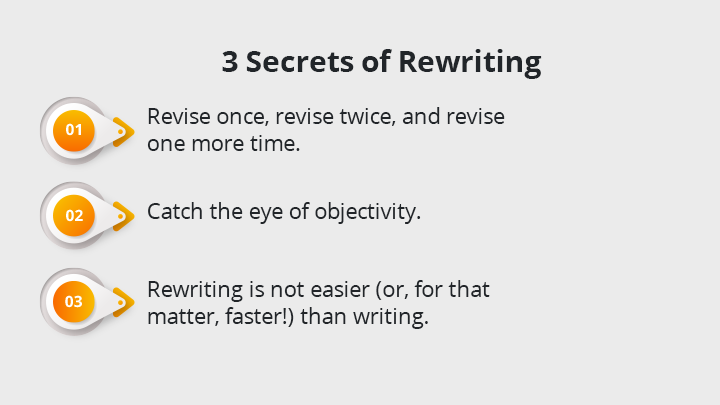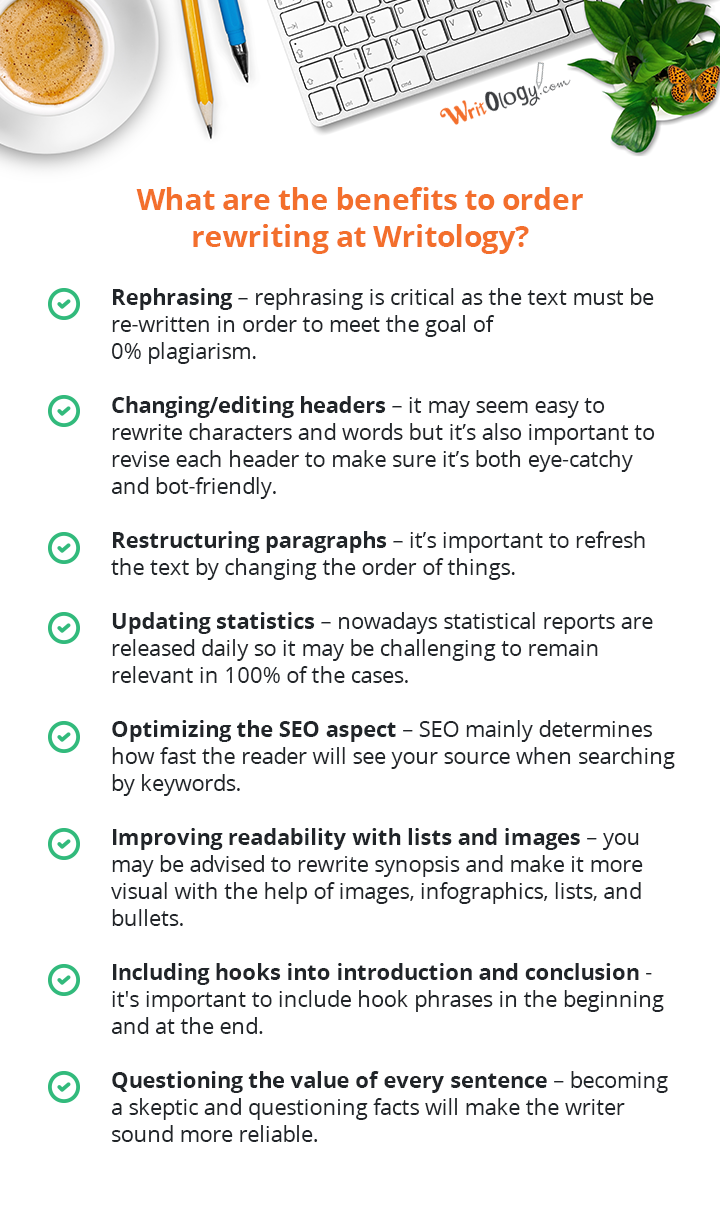Writing Is Rewriting? Really, What Is Rewriting and Why Do You Need It?


Writing and Rewriting: Rewriting for Quality
What does it mean to write or rewrite essays? The writing process is never-ending because any piece can be improved every time it’s read again – any article rewriter can tell you that! Even an article rewriter tool is imperfect meaning that as perspectives and tastes change with time, so do the preferred types and styles of writing. Of course, it’s possible to simply rewrite sentences without changing the meaning, but is this useful in 2019? What does rewrite mean? It’s much more than just raw idea stealing! If you are googling something like “how to re write my paper”, stop and think – because there is so much more you can do with it.
Rewrite or Re-Write: Writing is Rewriting? 3 Secrets
A written product can be magical, but only with the help of rewrite (or re-write). Actually, the essence of high-quality content is in understanding that writing is rewriting. It’s that rewriting which targets the perspective of the specific reader. If I were looking for someone to rewrite my article, I would definitely find someone, first of all, passionate about the topic at hand. With the help of the best rewriting services like Writology, a rough draft with uninteresting lists and scientific facts can turn into a blossomed article ready to harvest the readers’ attention. If you look closely, writing and rewriting are not different at all! And, in fact, there are 3 main ingredients that create a successful cocktail of rewrite content:
- Revise once, revise twice, and revise one more time. We will talk about it more, but revising a paragraph (each paragraph that you write, one by one) is key. Writology specialists know that talent is not in writing itself but in the discipline of rewriting exercises and constant revision.
- Catch the eye of objectivity. You can’t learn how to write like Hemingway without being objective and self-critical. This is true. The real secret to juicy masterpieces is writing revision and constant self-criticism. Never stop questioning yourself. What may seem an axiom to you may well be a shaky theorem to your readers – don’t forget that!
- Rewriting is not easier (or, for that matter, faster!) than writing. In essence, we can define rewrite in the same way as writing. It’s the same, except for rewriting has some factual basis, which must be checked before being put on paper. In such a way, one may even question what’s actually easier: operating facts and checking them to produce a decent rewrite, or simply choosing what to write about from the start?

Rewriting vs Revising: The Differences and Similarities
The rule of thumb is this: you can rewrite paragraph with correct punctuation by changing order (or even sometimes meaning) of sentences, or you can revise it to actually have some organic basis. Rewriting vs revising has a very thin line, and, for that matter, a blurred one. However, only with the help of both processes, a piece can become a masterpiece. Let’s consider these differences:
- What is rewriting and how to rewrite effectively?
The key to a high-quality product is rewriting notes. First comes free writing, and then multiple rewriting. Article rewriting gurus can literally show you the ‘bloodstains’ on the walls in their offices from pounding their heads when rewriting. You cannot have a well-written piece from the first try. After compiling notes, you have to work hard and rewrite or revise it multiple times. Rewriting services online – like Writology – have specialists who do this on a daily basis. Their experience is only measured by the number of texts they have rewritten until satisfactory.
- What is revise and how to revise an essay?
After the art of writing, comes the revision. One may wonder what is revision and what’s the point of it if the rewrite is good? Today, any writer may start to revise essay with the help of technology and various tools. They assist with finding minor grammar or punctuation mistakes. They also act as those ‘objectivity guards’.
- So, which one to choose: rewriting or revising?
Now on to the similarities between the two activities. Rewriting definition lies in the act of writing itself. It’s tedious and time-consuming. However, it produces the article which may be revised before it’s published, or simply offered for the readers’ consumption. The revising definition in writing is like making food easier to digest. Instead of raw facts, revision allows having a smooth and flawless chain of thought with easy readability.
How to Rewrite a Story or a Book
Now that understanding between the rewrite meaning and revise definition is more or less clear, let’s see how they work in action. When rewriting book or another literary piece (an article, a blog excerpt, or even a scientific piece), it’s time to comprehend why is drafting important.
The only way to rewrite a story and keep the intrigue is to understand it and make it ‘easy to digest’ for the reader. This is when both rewriting and revising skills come into play. Don’t be fooled by modern prolific writers who advocate fast writing. On the contrary, a quality novel takes years – or even decades – to produce. And, honoring Hemingway, it’s not going to be a 1000-page novel. A short but high-quality literary piece takes years of rewriting and revising before being put on the front shelves in bookstores.
Knowing how to rewrite a story and make it unique takes 3 steps. Actually, Writology rather views these steps as a circle of life and makes sure it’s repeated several times for every re-written piece:
- Free writing – this is a fast and boundary-free type of writing that can be compared to filling the pages in your personal diary every day;
- Rewriting the most interesting part – after an objective analysis, you may wish to rewrite certain parts to seem more intriguing and awe-inspiring. You may wish to add more detail, description, paradox, oxymoron, comparison, parallelism, and other literary devices;
- Revising – after a few steps of rewriting, a piece must be revised. Modern online tools may make this process faster. This includes grammar and punctuation revision and does not exclude objective cutting out of the unnecessary or redundant facts.
What is Rewriting: The Writology Style?
For Writology, to re write (or rewrite) a written piece means to not just put synonyms in different places. It’s a creative process which requires improving the text and making it more relevant. To put revise in a sentence for Writology means to produce a fresh and fascinating product. Contrary to the stereotypical approach (unfortunately) adopted by much modern content creating and editing agencies, article rewrite at Writology is a perpetual mechanism, which includes but is not limited to:
- Rephrasing – rephrasing is critical as the text must be re-written in order to meet the goal of 0% plagiarism, and, with so much content out there, this task is challenging enough;
- Changing/editing headers – it may seem easy to rewrite characters and words but it’s also important to revise each header to make sure it’s both eye-catchy and bot-friendly (otherwise, Google and other search engines won’t understand what the text is about);
- Restructuring paragraphs – it’s important to refresh the text by changing the order of things (unless it’s a set process being described) in order to make the reader awed and interested;
- Updating statistics – nowadays statistical reports are released daily so it may be challenging to remain relevant in 100% of the cases, but your readers will definitely appreciate the effort;
- Optimizing the SEO aspect – SEO mainly determines how fast the reader will see your source when searching by keywords, so neglecting this aspect would be the opposite of smart;
- Improving readability with lists and images – you may be advised to rewrite synopsis and make it more visual with the help of images, infographics, lists, and bullets, as they’re more attractive for the eye than the never-ending text on the screen;
- Including hooks into introduction and conclusion – what is one way to revise a narrative and make it more interesting? Of course, it’s hook phrases in the beginning and at the end;
- Questioning the value of every sentence – the last but not the least, becoming a skeptic and questioning facts will make the writer sound more reliable.

All in all, if a writer knows how to rewrite articles fast, he may be able to rephrase a few sentences here and there and create some new text simply to fill the page. At least, it’s better than showing a blank spot to the reader. However, this is not what created value. A truly valuable and relevant piece must be rewritten and revised several times. Therefore, writing and rewriting, as well as revising, are closely interlinked and do not really work separately. They work well in unison, and, if used well by the professional like Writology, will help create value and attract the readers’ attention with their quality end product.